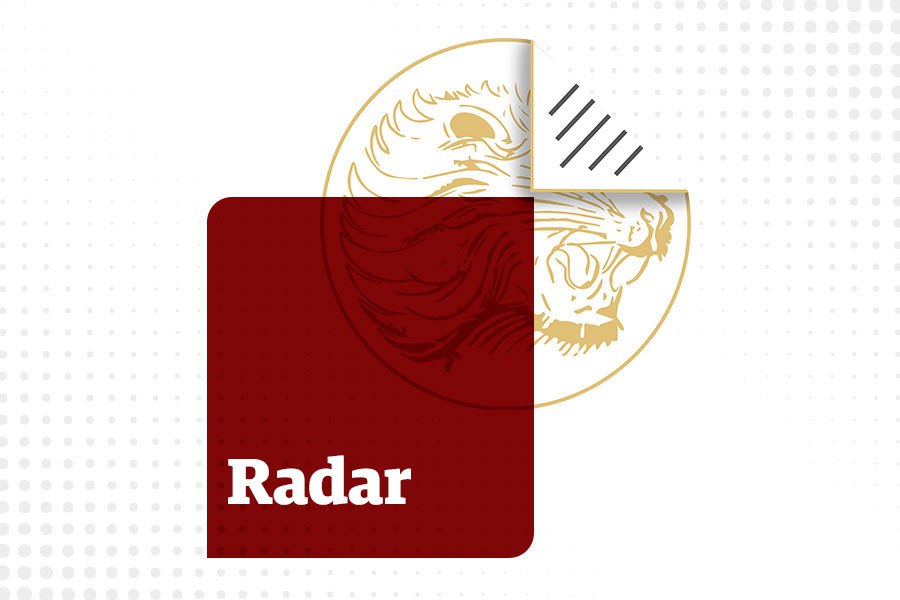
Agenda | Aug 24,2019
Experts at the Ministry of Agriculture have drafted a bill to fix shortfalls in the production, quality, and marketing of honey and apicultural products four years after the effort began.
The bill proposes a licensing system for the transportation of apicultural products and sets standards for storing and selling such commodities. The bill, which tackles the absence of regulatory policy in the beehive product sector, aims to confront poor production, supply, trade, and the prevalence of substandard quality.
Akalework Gizaw, a senior expert on bee resource development at the Ministry, says that the low quality of honey begins with beekeepers failing to store their harvest in sealed containers and jars, resulting in rapid deterioration.
“Retrograde practice and technology contribute to the impediment,” said Akalework.
The problem is further exacerbated by adulterating honey with sugar and chemicals in the value chain through intermediaries, wholesalers, and retailers. Akalework revealed that such practices lead to the high moisture content in the honey, causing fermentation.
“It loses its value and may reach the level of intoxication,” Akalework told Fortune.
Bees play a crucial role in global food production, with over three-quarters of the world’s food crops relying on pollination to reproduce. Pollination services are estimated to be worth up to 600 billion dollars annually. In Ethiopia, bees increase the production of fruits and vegetables by more than 50pc, while oilseed and coffee production is boosted by 40pc and 25pc, respectively. The southern and northern regions of the country, with their moderate temperatures, are particularly suitable for honey production.
Ethiopia is home to approximately 10 million bee colonies, half of which are hived, and over 800 identified honey bee forages. The country’s annual production potential is half a million tons of honey and 50,000tns of beeswax. A kilo of honey sells for an average of 300 Br in the domestic market, while it fetches three dollars in the international market, particularly in Europe and South America.
However, honey exports have experienced a sharp decline in the past decade, with a 76.8pc drop in honey and a 34.5pc decrease in wax exports. In 2015, Ethiopia exported nearly 681.2tns of honey but fell to 54tns last year. Over one-third of exporters have abandoned the business in the last five years, some resorting to illicit trade for better price deals. The declining supply, market, and value chains have also contributed to the deteriorating production quality and distribution.
Aziz Ayalew, head of the Ministry’s bee and fairy development desk, attributed the dwindling export revenues to the COVID-19 pandemic, price surges, and the underperformance of bee associations.
A committee was established a few months ago to merge the three bee associations - the Ethiopian Apiculture Board (EAB), the Ethiopian Society of Apiculture Science (ESAS), and the Ethiopian Honey & Beeswax Producers & Exporters Association (EHBPEA) - into a single entity.
“The merger is believed to increase their capacity,” said Aziz.
The Association was founded in 2006, comprising 20 processors and exporters under its umbrella. It was established to encourage honey production, ensuring the quality of processed and exported bee products. Alemseged Geberekidan, head of the Association, believes the merger will strengthen its capacity by reducing duplicated efforts and membership fees that exporters currently pay three times.
Alemseged acknowledges that the pandemic, financial constraints, and high taxes have impeded the competitiveness of the Association’s members. Given its significant role in managing the daily challenges of producers and exporters, he argued for the Association to take the lead in the merger process.
The growing commercial value of honey renders bees an increasingly important source of income and food security for small-scale producers and forest dwellers in many developing countries. Bee products and byproducts play a substantial role in supporting the livelihoods of smallholder farmers and communities. The domestic market offers 10 honey types, with over 20 colour varieties.
Green Face Trading Plc, incorporated five years ago, has been exporting honey and wax to European and US markets for the past four years. General Manager Jony Girma revealed that exports have declined over the years, attributing the downturn to production shortages and price increases in the domestic market. His company generated a quarter of a million dollars in export revenues last year, exporting 27tns of honey, marking a 20pc drop from the previous year.
Green Face Trading Plc sources honey products from its 245 harvesters in the Southwestern Regional State.
Jony argued that intermediaries inflate the price of honey, causing exporters to suffer losses.
“We fill our stock during harvest season to avoid intermediaries,” Jony told Fortune.
Agricultural economist Shimeles Araya (PhD) recommends contract farming as a practical tool for reducing transaction costs and bypassing intermediaries. He emphasized that honey is a delicate commodity requiring proper care and advanced technology, in contrast to the traditional methods employed by most Ethiopian farmers.
Shimeles suggested that Ethiopia should learn from countries like China, the world’s largest producer and exporter of honey, and equip its smallholder farmers with innovative ideas and technology rather than relying on traditional methods.
“Surplus production does not guarantee competitiveness,” he said. “Commercializing beekeeping is important.”
Experts like him see the proposed bill may potentially transform Ethiopia’s apicultural industry if implemented effectively. By enhancing production practices, quality control measures, and market dynamics, the legislation could pave the way for a more sustainable and lucrative sector. This, in turn, would improve the livelihoods of smallholder farmers and communities that rely on honey production and bee products.
PUBLISHED ON
Nov 20,2023 [ VOL
24 , NO
1230]

Agenda | Aug 24,2019

Fortune News | Mar 16,2024

Fortune News | Jan 02,2021

Radar | Apr 15,2023

Radar | Aug 13,2022

Fortune News | Aug 13,2022

Obituary | Mar 02,2024

Radar |

Fortune News | Jun 29,2025

Viewpoints | Feb 24,2024

Dec 22 , 2024 . By TIZITA SHEWAFERAW
Charged with transforming colossal state-owned enterprises into modern and competitiv...

Aug 18 , 2024 . By AKSAH ITALO
Although predictable Yonas Zerihun's job in the ride-hailing service is not immune to...

Jul 28 , 2024 . By TIZITA SHEWAFERAW
Unhabitual, perhaps too many, Samuel Gebreyohannes, 38, used to occasionally enjoy a couple of beers at breakfast. However, he recently swit...

Jul 13 , 2024 . By AKSAH ITALO
Investors who rely on tractors, trucks, and field vehicles for commuting, transporting commodities, and f...

Jul 5 , 2025
Six years ago, Ethiopia was the darling of international liberal commentators. A year...

Jun 28 , 2025
Meseret Damtie, the assertive auditor general, has never been shy about naming names...

Jun 21 , 2025
A well-worn adage says, “Budget is not destiny, but it is direction.” Examining t...

Jun 14 , 2025
Yet again, the Horn of Africa is bracing for trouble. A region already frayed by wars...